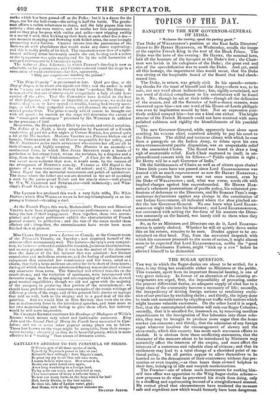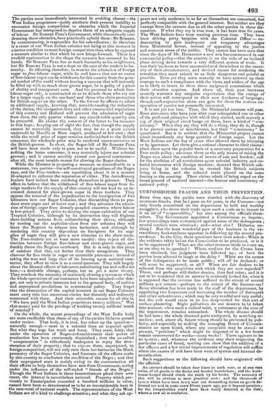THE SUGAR QUESTION.
THE way in which the Sugar-duties are about to be settled, for a time, is any thing but creditable either to Ministers or the public. This measure, apart from its important financial bearing, is one of very great delicacy. In favour of an alteration of the existing ar- rangements are urged, first, the impossibility of procuring, under the present differential duties, an adequate supply of what has to -a large class of the community become a necessary of life; secondly, the inexpediency of driving foreign nations to retaliatory exclu- sion of our produce by excluding theirs ; and thirdly, the injury done to trade and manufactures by crippling our traffic with nations which might become valuable customers. On the other hand it is urged, first, that the contemplated alteration will ruin our Sugar Colonies; secondly, that it is uncalled for, inasmuch as, by removing needless impediments to the immiaration of free labourers into those colo- nies, they may be brought to produce more sugar than the home market can consume ; and thirdly, that the admission of any foreign sugar whatever involves the encouragement of slavery and the slave-trade, which this country has made such strenuous efforts to abolish. It is obvious from these conflicting statements, that the character of the measure about to be introduced by Ministers may materially affect the interests of the empire, and must affect the interests of a numerous and valuable class of citizens ; and that its settlement may lead to a total change of a cherished point of na- tional policy. Yet all parties appear to allow themselves to be hurried on to the denouement of their controversy without due pre- caution or even inquiry,—as time bears them onward helpless to their fate, indulging in idle and waspish recriminations.
The Premier—one of whose main instruments for working
self into office was opposition to the Whig Sugar-duties scheme— now proposes to do what he prevented his rivals from doing, only in a shuffling and equivocating instead of a straightforward manner. He cannot plead that circumstances have rendered the measure safe and expedient now which would formerly have been dangeroup. The parties most immediately interested in avoiding change—the West Indian proprietors—justly attribute their present inability to encounter foreign competition to obstacles which the Imperial Government has interposed to deprive them of an adequate supply of labour. Sir ROBERT PEEL'S Government, while theoretically con- demning these obstacles, have practically upheld them : Sir ROBERT, by countenancing, is responsible for his subordinates : he therefore is a cause of our West Indian colonies not being at this moment in a better condition to meet foreign competition than when he opposed a measure similar to that which he now brings forward. There is a twofold equivocation in the shape the measure has assumed in his hands. Sir ROBERT PEEL has as much humanity as his neighbours, but Sir ROBERT PEEL is not a dupe to the cant of the traders in hu- manity. In affecting, therefore, to restrict the admission of foreign sugar tofree-labour sugar, while he well knoas that not an ounce of free-labour sugar can be withdrawn for this country from the gene- ral market of the world without leaving a vacuum that will instantly be filled up with as much slave-grown sugar, he is guilty of a piece of shabby and transparent cant. And his proposal to admit free- labour sugar only, is constructed so as to delude those who cry out for a larger supply on the one hand and those who claim protection for British sugars on the other. To the former he affects to admit an additional supply, knowing that, notwithstanding the reduction of the duties, the navigation-laws and other commercial regulations of this country and Holland will prevent the admission of sugar from Java, the only quarter whence any considerable quantity can be procured. Ile claims the consent of the latter to his measure in this hope; keeping out of sight the fact, that though the supply cannot be materially increased, they may be to a great extent undersold by Manilla or Siam sugars, produced at low cost ; that while the retail price of sugar remains undiminished to the British consumer, the wholesale price may be rendered unremunerative to the British grower. In short, the Sugar-bill of Sir ROBERT PEEL will have been made only to pass, not to be useful. Without be- nefiting the home consumer, it may materially injure our colonial growers ; and it cannot sensibly extend our general commerce— after all, the most tenable reason for altering the Sugar-duties. While the Minister is preparing a measure so discreditable to a statesman, two parties—the self-constituted guardians of the Negro race, and the Free-traders—are squabbling about it in a manner ill-adapted to enhance the reputation of either. The Anti-Slavery leaders have indeed been outdoing themselves in grimace. They affect to believe that the withdrawal of free-labour sugar from fo- reign markets for the supply of this country will not lead to an in- creased demand for slave-grown sugar in these markets. They oppose the removal of the impediments to the immigration of free labourers into our Sugar Colonies, thus disenabling them to pro- duce more sugar and at lower cost ; and they advocate the admis- sion of foreign sugar from densely-peopled countries where labour is low-priced. They strive to destroy the sugar-cultivation of our Tropical Colonies, although by its destruction they will frighten slave-holding nations from enfranchising their slaves, although by rooting out the capitalist-class from our colonies they will leave the Negroes to relapse into barbarism, and although by rendering this country dependent on foreigners for its sup- plies of sugar they will give a new stimulus to the slave-trade. The Free-traders are at least more candid : they reject all dis- tinction between foreign free-labour and slave-grown sugar, and frankly throw the Negroes overboard. But it is only in this piece of candour that they act better than their antagonists. They clamour for free trade in sugar on untenable pretences : instead of taking the true and large view of its bearing upon national com- merce, they affect to view it as a moral question. They talk largely about the blessed effects of labourers substituting tea and coffee for beer,—a desirable change, perhaps, but as yet a mere theory. They overlook the necessity of cautiously altering a system to which the whole operations of our commerce have been adapted—the dan- ger, not only to private interests but to the general body, of sudden and unprepared revolutions in commercial policy. They forget that the destruction of the capital invested in our Sugar Colonies must carry ruin into numerous circles but distantly and indirectly connected with them. And their miserable excuse for all this is, "We have paid the West Indian proprietors twenty millions." Was that money paid for the privilege of working twenty millions' worth of mischief?
On the whole, the recent proceedings of the West India body are more creditable than those of any of the parties hitherto passed under review. That body, it is true, has taken up the question— naturally enough—more in a colonial than an imperial spirit. But what they urge has truth and force. They state, fairly, that under the operation of Negro-enfranchisement their power of production has been enormously diminished ; that the so-called " compensation " is ridiculously inadequate to repay the dete- rioration of their property; that to expose them, unprepared, to foreign competition, will not only ruin them but barbarize the Black peasantry of the Sugar Colonies, and frustrate all the efforts made by this country to ameliorate the condition of the Negro; and that their unprepared state is mainly owing to the counteraction all , their efforts to help themselves have met from Government, acting under the influence of the self-styled "friends of the Negro." Though the West Indians in these remonstrances plead their own cause, the interest is nevertheless national. Property which pre- viously to Emancipation exceeded a hundred millions in value, cannot have been so deteriorated as to be an inconsiderable item in the sum-total of national wealth. The representations of the West Indians are of a kind to challenge attention; and what they ask ap-
pears not only moderate in so far as themselves are concerned, but perfectly compatible with the general interest. But neither are they exempt from the censure due to all the other parties in these dis- cussions. If what they say is true now, it has been true for years. The West Indians have been wasting precious time. They have been driving petty bargains with the Colonial Office — en- deavouring to gain inadequate and temporary advantages from Ministerial favour, instead of appealing to the justice and common sense of the public. They cannot but have seen that since the days of Mr. Husnissorr a new aera has commenced in our commercial policy—that the country is on the rails of an inclined plane driving down towards a very different system of trade. It was their business to have accommodated themselves to the neces- sity of their circumstances, and devised means for rendering the transition they must submit to as little dangerous and painful as possible. Even yet they seem scarcely to have screwed up their courage to such a compliance with the views and wishes of the age as is likely to insure to them those reciprocal concessions which their situation requires. And above all, their past inertness scarcely warrants any sanguine expectation that the energy of their action will correspond to their new frankness of language; though such expectation alone can gain for them the zealous co- operation of parties not personally interested.
It is not yet too late. True, the Ministerial measure will pass. Even statesmen who have year after year relinquished one or other of the professed principles with which they started, until scarcely a rag of their original creed hangs on them, have a kind of "con- sistency." When they say they will do a thing, they do it, though it be proved useless or mischievous, lest their " consistency" be questioned. But it is evident that the Ministerial project cannot admit immediately any large quantity of foreign sugar. Let the West Indians use the day of grace thus allowed them by trimming or by ignorance. Let them give a national character to their claims : place them upon the popular basis of a necessary preparation foi a Free-trade policy ; advocate them as the only means of raising the Negro race above the condition of beasts of sale and burden ; call for the abolition of all restrictions upon colonial industry and co- lonial intercourse with foreign markets ; demand that British sub- jects living in the colonies be treated like British subjects living at home, and the colonial trade placed on the same footing as the coasting. These claims admit of being urged on the broad ground of national interest—the honour and consistency of national policy.



























 Previous page
Previous page